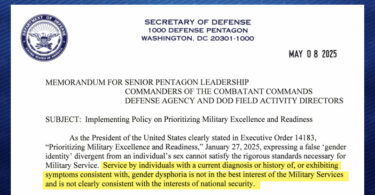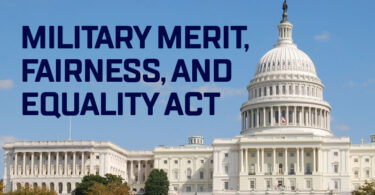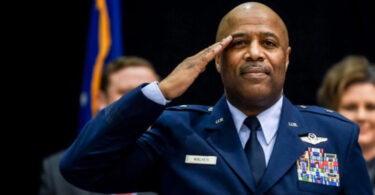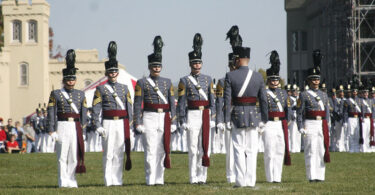Unfortunate, because cadets still won’t know if they are selected because of their abilities or because of their skin color (or maybe were not selected because of their skin color). See STARRS Interviews 3 Former West Point Cadets and Nickaylah Sampson’s Experience at West Point was the Racism of Low Expectations
By Micaela Burrow, The Daily Caller News Foundation
The Supreme Court excluded military academies from its landmark ruling Thursday which struck down race-based admissions in university admissions, leaving their existing policies untouched for now.
In a 6-3 decision, the court ruled that Harvard University and the University of North Carolina’s use of racial preferences in admissions violated the Equal Protection Clause of the 14th Amendment, overruling a prior decision that allowed universities to consider race.
But the court did not consider any cases involving the military, opting instead to leave out the question of racial preference in service academies’ admissions decisions due to the “potentially distinct interests” they might hold, according to the opinion.
“No military academy is a party to these cases, however, and none of the courts below addressed the propriety of race-based admissions systems in that context,” Chief Justice John Roberts wrote in a footnote to the majority opinion. “This opinion also does not address the issue,” he added, “in light of the potentially distinct interests that military academies may present.”
In her dissent, Justice Sonia Sotomayor described the ruling as a “carveout” for service academies. She called the exemption arbitrary, disputing the logic that no military academies were party to the ruling because the court did not similarly exempt religious schools who were also not direct parties.
“In a footnote, the Court exempts military academies from its ruling in light of ‘the potentially distinct interests’ they may present,” she wrote. But, “national security interests are also implicated at civilian universities,” especially those hosting Reserve Officer Training Corps (ROTC) programs that routinely commission military officers
The Pentagon has made a point of increasing racial diversity in the officer corps.
“The Court has come to rest on the bottom-line conclusion that racial diversity in higher education is only worth potentially preserving insofar as it might be needed to prepare Black Americans and other underrepresented minorities for success in the bunker, not the boardroom (a particularly awkward place to land, in light of the history the majority opts to ignore),” Justice Ketanji Brown-Jackson wrote, agreeing with Sotomayor.
But experts said that the case is not settled just yet.
“The reason these cases don’t apply to service academies is because there were no services academies who were parties to the litigation. The court left the question of whether service academies can use race-based admissions policies for another day,” Mike Berry, general counsel for First Liberty Institute and a former Army attorney, explained to the Daily Caller News Foundation.
No, Affirmative Action In The Military Doesn’t Boost National Security, It Erodes It
By Gen. Ronald R. Fogleman (USAFA graduate, former Air Force Chief of Staff) and Claude M. (Scott) McQuarrie III (West Point graduate, former infantry officer, lawyer)
BRIEF OF VETERANS FOR FAIRNESS AND MERIT AS AMICUS CURIAE (pdf)
Service academies exempt from Supreme Court affirmative action ruling (Navy Times, 29 JUN 23)
The Supreme Court stopped short of ending affirmative action in military service academies in a historic decision Thursday that otherwise banned the practice in universities.
The justices writing for the 6-3 conservative majority noted the federal government had written a friend-of-the court brief urging them to protect the use of race as a factor in admissions decisions — often called affirmative action — in part to ensure racial diversity in service academies. . . .
. . . The Supreme Court’s majority agreed, writing that affirmative action violates the clause of the 14th Amendment that ensures “equal protection of the laws” regardless of race.
“Eliminating racial discrimination means eliminating all of it,” Roberts wrote for the majority.
Supporters of affirmative action have maintained that universities have a compelling interest in enrolling a racially diverse student body. And that goal, they insisted, would be next to impossible to achieve without race-conscious admissions.
In August 2022, 35 former top military leaders — including four former chairmen of the Joint Chiefs of Staff, among them retired Marine Gen. General Joseph Dunford and retired Navy Adm. Michael Mullen, and eight former service academy superintendents — filed a friend-of-the-court brief arguing that affirmative action was necessary for national security.
The retired leaders emphasized that the officer corps already is significantly less racially diverse than the enlisted troops. Increasing that gap, they warned, could diminish the military’s legitimacy in the eyes of some Americans, hinder engagement with foreign countries and threaten internal morale.
Many veterans have dismissed claims that affirmative action is necessary for national security.
A group of more than 600 veterans — among them 21 Medal of Honor recipients and some former leaders of service academies — in May 2022 filed a friend-of-the-court brief asking the Supreme Court to ban the practice.
Far from boosting morale, this group maintained, affirmative action “can only foster a culture of arbitrary advancement, disunity, and frustration.” . . . (read more)
Military Academies Exempted from Supreme Court Ruling Ending Affirmative Action (Military.com, 29 June 23)
Race-based affirmative action is unconstitutional at public and private universities in the United States, the United States Supreme Court decided in a ruling issued Thursday. But that ruling won’t affect military service academies — at least, not yet.
In a 6-3 decision along ideological lines favoring conservative justices, the Supreme Court rejected the long-held premise that race could be used as a consideration during the college admissions process. Race-based policies, collectively often called “affirmative action,” have been in place in some form since the 1960s.
The majority opinion argued that the policies violated key components of the constitution, including the 14th Amendment that outlines “equal protection” under the law.
However, the Court specifically exempted the military academies from its decision on race-based affirmative action.
The majority opinion, written by Chief Justice John Roberts, said in a footnote that this policy would not impact how military service academies approached admissions, citing “distinct interests” those institutions have.
“The special nature of military academies and their interests was addressed in an important amicus brief filed in Grutter v. Bollinger almost 20 years ago,” said Lawrence Friedman, JD, professor of law at New England Law Boston. “The Supreme Court’s decision tacitly acknowledges that.”
The Supreme Court’s decision allows the academies to continue race-conscious admissions policies that have historically been justified by the need for a diverse officer corps. As of 2022 the Department of Defense’s Office of Diversity, Equity, and Inclusion assessed that while 19% of the military’s enlisted personnel were Black, only 8% of its officers were Black.
“The military knows that if you don’t get a diverse set of student leaders into commissioning sources, you don’t get diverse officer leadership,” said Daniel Walker, an Air Force Academy alum and former F-22 pilot. Currently a JD candidate at Harvard Law School, and a member of the Black Veterans Project, Walker said he believed that less diversity in leadership led to a weaker overall force. . . . (read more)








Leave a Comment